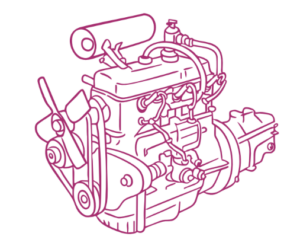(R)EVOLUTION - The rise of the diesel engine
The rise of the diesel engine
The diesel engine is undoubtedly one of the inventions that has had the greatest impact on the history of the automobile and industry. A symbol of energy efficiency, it originated at the end of the 19th century, when Rudolf Diesel filed a patent in 1892 for an engine designed to offer much higher efficiency than petrol. His goal was clear: to convert more of the energy contained in fuel into useful power, while limiting losses. This bold vision laid the foundations for a technology that would enjoy an exceptional trajectory throughout the 20th century.
For a long time, diesel remained the preserve of heavy goods vehicles, agricultural machinery and industrial vehicles. Its high torque, endurance and fuel efficiency made it indispensable for professional use, but it remained absent from the consumer car market. Everything changed in 1976, when Volkswagen decided to integrate a diesel engine into a compact and popular model for the first time: the Golf. In the midst of the oil crisis, when motorists were looking to reduce their fuel consumption, this strategic choice ushered in a new era. Diesel became accessible to all and appealed to a wide audience with its autonomy, robustness and economy of use.
This turning point sparked a wave of technical innovations. Direct injection improved fuel metering precision and further increased efficiency. Turbochargers boosted power without compromising fuel economy. Gradually, emission control systems were developed to meet new environmental requirements, incorporating particulate filters and catalytic converters to reduce harmful emissions. Diesel engines became more refined, quieter, smoother and more efficient, establishing themselves as the engine of choice in Europe from the 1980s and 1990s onwards.
But the history of diesel does not end there. Faced with climate challenges and new consumer expectations, this technology has had to adapt and reinvent itself. Today, hybrid diesel engines, combining a fuel-efficient combustion engine with an electric motor, are continuing this drive for innovation. Research into biofuels, derived from renewable resources, is also opening up new prospects for extending the relevance of this engine in an era focused on sustainable mobility.
From Rudolf Diesel’s patent to its democratisation by Volkswagen, from the major technical innovations of the 1970s to today’s hybrid and alternative solutions, the diesel engine tells a story of constant adaptation and continuous progress. It illustrates how an invention born out of an ideal of energy efficiency has stood the test of time, adapted to crises and remained a central player in the evolution of the modern automobile.



